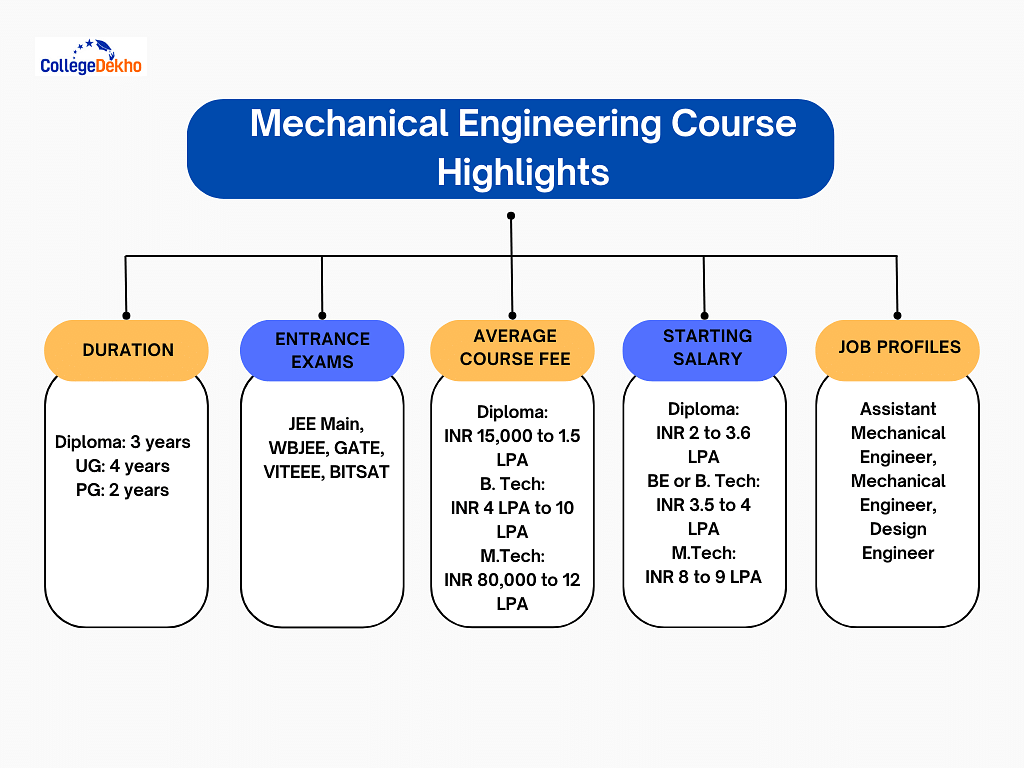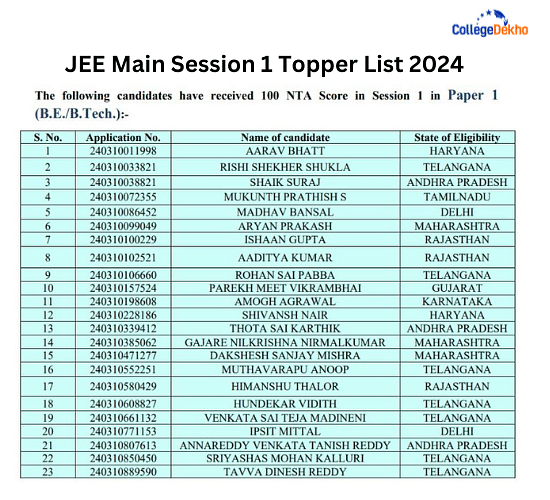Mechanical Engineering
Mechanical Engineering Course Overview
Mechanical Engineering is a branch of engineering that studies physical machines involving force and movement. It merges the principles of engineering physics and mathematics with materials science to design, analyze, manufacture, and maintain mechanical systems. The duration of a Mechanical Engineering course can vary from 3 to 5 years depending on the level. A student pursuing a Mechanical Engineering programme will acquire knowledge about designing automobiles, electric motors, aircraft, and other heavy vehicles. Candidates who wish to be admitted into mechanical engineering courses can take them after the conclusion of their class 12th from a recognized institution with at least 50% marks in aggregate having Physics, Chemistry, and Mathematics as the main subjects. Candidates must have a BE/BTech in Mechanical Engineering to be eligible to enroll in MTech Mechanical Engineering courses.
One of the oldest and most extensive branches of engineering is Mechanical Engineering, which focuses on the conception, fabrication, and operation of machinery and its components. Mechanical engineers apply basic physical principles to analyze, design, produce, and maintain a wide range of mechanical systems, while also addressing challenges related to thermal and fluid systems.
Mechanical Engineering Syllabus includes subjects such as Machine Design, Mechanical Measurements, etc. Mechanical Engineering Admission can be done through merit as well as entrance exams. Some of the top Mechanical Engineering entrance exams are JEE Main, JEE Advanced, MHT CET, TS EAMCET, WBJEE, etc. Online mechanical engineering can be done from reputable institutes such as Coursera, EdX, Swayam, etc. The offline Mechanical Engineering courses can be pursued at IIT Madras, IIT Bombay, IIT Roorkee, Chandigarh University, CT University, UPES Dehradun, and more. The offline mechanical engineering fees are approximately INR 1,00,000 to INR 15,00,000 depending on the course structure.
After completing the course, students are introduced to Mechanical Engineering jobs that include Design Engineers, Purchase and Quality Control Executives, Instructional Design, Mechanical engineers, Service engineers, etc. The average Mechanical Engineering Salary ranges between INR 1.2 LPA and INR 7.7 LPA.
Mechanical Engineering Courses Latest Update
NIT Trichy GATE Cutoff 2024 is available. Check the Expected cutoff and previous years cutoff marks here.
Table of Contents
- Mechanical Engineering Course Overview
- Mechanical Engineering Courses Latest Update
- Mechanical Engineering Course Details: Highlights
- Why Choose a Mechanical Engineering Degree?
- Mechanical Engineering Course Eligibility Criteria
- Mechanical Engineering Entrance Exams
- NTA Toppers for Session 1 JEE Main 2024
- List of Popular Mechanical Engineering Specializations
- Mechanical Engineering JEE Advanced Cut Off 2023
- Mechanical Engineering Admission Process in India
- Direct Mechanical Engineering Admission Process Without Entrance Exam
- Mechanical Engineering Fees in India
- Mechanical Engineering Syllabus and Subjects
- What is an Online Mechanical Engineering Degree?
- What is the Difference Between Mechanical Engineering vs Civil Engineering vs Mechatronics Engineering?
- Top Private Mechanical Engineering Colleges in India
- Top Government Mechanical Engineering Colleges in India
- Top Mechanical Engineering Colleges Offering Direct Admission in India
- Career Options and Job Prospects After Mechanical Engineering
- Courses After Mechanical Engineering Degree
- FAQs about Mechanical Engineering
Mechanical Engineering Course Details: Highlights
The major highlights of the Mechanical Engineering courses are given in the table below:
| Particulars | Details |
|---|---|
| Name | Mechanical Engineering Course |
| Level of Programme | Diploma, UG, PG, and PhD |
| Duration |
|
| Exam Type | Semester-wise |
| Eligibility Criteria |
|
| Admission Process | Merit-Based + Entrance Exam |
| Top Entrance Exams | JEE Main, GATE, WBJEE, GATE, VITEEE, BITSAT, etc. |
| Average Course Fee | |
| Average Starting Salary |
|
| Job Profiles | Assistant Mechanical Engineer, Mechanical Engineer, Design Engineer, Professor/Lecturer, Mechanical Technician, Lab Assistant, etc. |
| Major Recruiters | Hindustan Petroleum Corporation Ltd, Larsen & Toubro, BMW, Reliance Industries, TATA Motors, Toshiba, and more. |

Why Choose a Mechanical Engineering Degree?
India is becoming a well-known global manufacturing hub, leading to a high demand for skilled mechanical engineers in industries such as automotive, aerospace, power generation, and machinery. According to Invest India, the Indian manufacturing sector is predicted to reach $1 trillion by 2025. The integration of automation, robotics, and additive manufacturing into industries creates new opportunities for engineers with relevant skill sets. The National Mission on Interdisciplinary Cyber-Physical Systems (NM-ICPS) highlights the importance of engineers who can merge mechanical engineering with other disciplines. However, despite the high demand, there is a gap between the number of qualified mechanical engineers required and the available workforce. A report by The Associated Chambers of Commerce and Industry of India (ASSOCHAM) predicts a shortage of 2 million mechanical engineers in India by 2022. The following are some reasons to choose a Mechanical Engineering course:
- Abundance of Career Opportunities: Pursuing the course may lead to professions in a variety of fields, including sales, agriculture, chemistry, and construction. They may also find opportunities in sectors such as robotics, nanotechnology, or aeronautics.
- Be a Part of Innovation: The course plays a critical role in pushing technical progress and innovation. They work on new product development, refining current technologies, and pushing the frontiers of technical solutions.
- Global Prospects: Mechanical engineering is an internationally known subject that provides chances for worldwide job experiences and partnerships. India has various skilled engineers that are highly demanded by international companies and abroad.
- Impact on Society: Mechanical engineers have the opportunity to positively affect society. Mechanical engineers' work may help to improve quality of life, promote environmental sustainability, and address global concerns, from generating sustainable energy solutions to upgrading transportation systems and inventing medical gadgets.
Mechanical Engineering Course Eligibility Criteria
In India, the eligibility criteria for Mechanical Engineering courses may vary from one college or university to another. The table below discusses the prerequisites for the course at different academic levels:
| Degree Type | Eligibility Highlights |
|---|---|
| Diploma | Candidates applying for diploma courses should have obtained at least 50% aggregate marks in class 10th from any recognized board. |
| BE/ BTech | Students applying for bachelor’s degrees should be 10+2 qualified in the Science stream with Physics, Chemistry, and Mathematics as compulsory subjects from a recognized board with at least an aggregate score of 50%. |
| M.Tech | Applicants must hold a bachelor’s degree in a relevant field of study with 50% to 60% aggregate marks from a recognized board. |
Required Skill Set for Mechanical Engineering
The skills required to succeed in the field of mechanical engineering have been explained below.
Technical Skills
Mathematics - Mechanical engineers should have a strong knowledge of mathematics, including calculus, algebra, and differential equations. They use mathematics to solve problems in fluid mechanics, thermodynamics, mechanics, and other areas of engineering.
Physics - A strong understanding of physics is required by mechanical engineers including thermodynamics, mechanics, and fluid mechanics. Physics is used to understand the behavior of mechanical systems and analyze them.
Engineering principles - It is essential to keep up with fracture mechanics, stress analysis, fatigue, and materials science to design and analyze mechanical systems that will ensure that they are secure and reliable.
Design - Mechanical engineers should be able to design mechanical systems utilizing computer-aided design (CAD) software, and create engineering drawings.
Fabrication - They need to have a strong understanding of fabrication techniques, such as welding, machining, and assembly. They are required to be able to manufacture prototypes and production parts.
Communication and Interpersonal Skills
Effective communication is important for mechanical engineers to interact with colleagues, clients, and stakeholders. They should be capable of writing concise and precise technical reports and delivering presentations that are effortless to understand. Mechanical engineers should have strong interpersonal skills to work efficiently in teams. It is compulsory to cooperate with others to attain common goals and solve concerns.
Apart from these fundamental skills, mechanical engineers should focus on developing competencies in the following areas -
- Project management - Mechanical engineers need to manage complex engineering projects. They should schedule, plan, and execute projects efficiently.
- Problem-solving - Cracking difficult problems is an essential skill for mechanical engineers. Pinpointing problems, collecting information, interpreting data, and creating solutions are important elements of their job.
- Creativity - Mechanical engineers need to be innovative while solving issues. They should come up with creative ideas and techniques.
- Leadership -Mechanical engineers may lead teams or projects. They should provide direction, motivation, and support to others.
Mechanical Engineering Entrance Exams
Admission to the majority of engineering colleges in India is primarily done through the entrance exam. Among all, JEE Main is the popular mechanical engineering entrance exam conducted that offers admission to top colleges like NIT, IIITs, GFTI, etc. There are several other national-level, state-level, and university-level entrance exams for Mechanical Engineering courses also conducted for admission as listed below:
JEE Main: Joint Entrance Examination (JEE) Main is a national-level engineering entrance exam in India conducted by the National Testing Agency (NTA). It serves as the first stage for admission into undergraduate engineering programmes in prestigious institutions like NITs, BITS, COEP, and other centrally funded technical institutes. JEE Main 2024 is scheduled to be conducted in 2 phases. The session 1 JEE Main 2024 was conducted on January 24 to February 1, 2024, while the session 2 will be conducted from April 1 to 15, 2024.
JEE Advanced: This exam is the second stage of the JEE Main and is conducted for admission to the Indian Institutes of Technology (IITs). Only candidates who qualify in JEE Main are eligible to appear for JEE Advanced, which tests the advanced knowledge and problem-solving skills of aspiring engineers. JEE Advanced will be conducted on May 26, 2024.
BITSAT: Birla Institute of Technology and Science Admission Test (BITSAT) is an entrance test administered for undergraduate engineering degrees at its three campuses in Pilani, Goa, and Hyderabad. The BITSAT Session 1 dates are May 21 to 26, 2024, and Session 2 dates are June 22 to 26, 2024.
SRMJEEE: SRM Joint Engineering Entrance Examination (SRMJEEE) is held for admission to the institute's BTech programmes. Candidates who are chosen based on their SRMJEEE scores are assigned a campus and a course depending on their course preferences at the time of counselling. You can also check What is a Good Score & Rank in SRMJEEE 2024? The Phase 1 SRMJEEE 2024 exam will be conducted from 20 April 2024 to 22 April 2024.
GATE: The Graduate Aptitude Test in Engineering (GATE) is a national-level test for admission to postgraduate engineering, technology, and architectural schools. GATE scores are often employed in government organizations and public sector enterprises (PSUs) for recruitment. GATE 2024 was conducted on 3rd, 4th, 10th and 11th of February 2024
MHT CET: The State Common Entrance Test Cell, Maharashtra, administers the Maharashtra Common Entrance Test (MHT CET) for admission to undergraduate engineering programmes in institutions throughout the state. MHT CET 2024 dates are April 16 to 30, 2024.
WBJEE: West Bengal Joint Entrance Examination (WBJEE) is the state-level exam for admission to undergraduate engineering programmes in colleges in West Bengal. WBJEE 2024 will be conducted on April 28, 2024.
NTA Toppers for Session 1 JEE Main 2024

JEE Main Cutoff 2023
Candidates can check the cutoff for JEE Main 2023 released by the National Testing Agency in the table below.
- Common Rank List - 90.7788642
- Gen-EWS - 75.6229025
- OBC-NC - 73.6114227
- SC - 51.9776027
- ST - 37.2348772
- PwD - 0.0013527
List of Popular Mechanical Engineering Specializations
Various popular Mechanical Engineering courses specializations can be pursued by the students. The following table shows the same:
| BE/ BTech ME Specialisations | MTech ME Specialisations |
|---|---|
| Marine Engineering | Tool Engineering |
| Engineering Design | Thermal Power Engineering |
| Transportation Systems | Mechatronics |
| Robotics, Automation, and Control | Mechanical System Design and Dynamics |
| Automobile Engineering | Machine Design |
| Biomedical Engineering | Automotive Engineering |
| Nanotechnology | Industrial Automation and Robotics |
| Materials Engineering | Applied Mechanics |
| Fluid Mechanics or Hydraulics Engineering |
Apart from the above-mentioned course specializations, other online Mechanical Engineering courses can be pursued online up to the Ph.D. level depending on their preferences.
- Power Electronics
- CAD and digital manufacturing
- Wind manufacturing
Also Check,
Mechanical Engineering JEE Advanced Cut Off 2023
The Joint Entrance Examination (JEE) is a set of tests that students in India take to get admitted to undergraduate engineering and medical programs. These tests are conducted by the National Testing Agency (NTA). The cut-off score required to get admission varies from institution to institution and also depends on the field of study that the student is interested in.
| Name | EWS | General | PwD | OBC | ST | SC |
|---|---|---|---|---|---|---|
| IIT Delhi | 384 | 1791 | 47 | 1034 | 295 | 558 |
| IIT Madras | 514 | 2572 | NA | 1251 | 430 | 976 |
| IIT Kanpur | 537 | 2940 | NA | 1479 | 461 | 970 |
| IIT Bombay | 376 | 1736 | 66 | 972 | 261 | 496 |
| IIT Roorkee | 649 | 3854 | NA | 1942 | 543 | 1032 |
JEE Main Cutoff For IIIT, GFTI, NIT
Mechanical Engineering Admission Process in India
The table below highlights the admission processes of Mechanical Engineering courses under various domains such as BE/B Tech, M.Tech, and diploma.
| Course | Admission Process |
|---|---|
| Diploma | Admissions are offered to the students based on the qualifying exam marks obtained in class 10. However, some top institutions may conduct their entrance exam followed by a personal interview round. |
| BE/B Tech | Students are offered admission based on the entrance exam such as JEE Main, JEE Advanced, UPSEE, WBJEE, etc. To apply for Lateral Entry, students with a three-year Diploma from a recognised institution are offered direct merit-based admissions. |
| M.Tech | Students are offered admissions based on the entrance exam scores obtained by them like GATE, BITS HD, etc. |
Also Check -List of NIT Colleges in India 2024
.png)
Direct Mechanical Engineering Admission Process Without Entrance Exam
There are several ways by which candidates can get admission to Mechanical Engineering direct courses. Some of the options have been explained below -
- Direct Admission Based on Academic Performance - Some universities such as BITS Pilani, UPES Dehradun, Anna University, etc. directly admit students based on their academic performance in high school or a pre-university program. Usually, this requires you to reach a certain GPA (grade point average) or percentage.
- Merit-Based Admissions - Merit-based admissions consider factors such as high school grades, extracurricular activities, and sometimes standardized test scores. Universities such as IITs, and NITs may have predetermined cutoffs or eligibility criteria based on these criteria.
- Employee Seats: Some organizations allocate a certain percentage of seats for direct entry through employee numbers. These seats are usually filled based on a candidate’s academic performance or other criteria and may carry higher tuition fees.
- Diploma-to-degree programs - Some universities such as Jamia Millia Islamia University, Delhi Technological University, Lingaya's University, etc. offer diploma-to-degree programs where students with an appropriate diploma in an engineering or related field can enter directly into the second or third-year of an engineering program
- Work Experience: In some cases, students with relevant work experience or completion of a professional course in a related field may be eligible for direct entry.
- Interviews and Personal Information - Mechanical Engineering colleges may conduct interviews or consider personal information as part of the admissions process. This allows applicants to express their interest in technology and explain their requirements.
- Special admissions for specific groups - Some colleges such as SRM University, Sri Venkateswara College, New Delhi, etc. may have special recognition for groups such as athletes, artists, or individuals with exceptional talent These admissions are often based on departments or other specific criteria.
Also Check - Engineering Admission Process 2024
Mechanical Engineering Fees in India
The average fee for Mechanical Engineering courses in India ranges between INR 2 p.a. and INR 12 p.a.. The fee for this programme depends on the type and level of the programme as well as the type of institute (whether government or private) one wants to enrol in. The following table shows the average Mechanical Engineering course fee for popular colleges in India:
| College Name | Average Fees |
|---|---|
| Annamalai University | INR 1 p.a. |
| Chandigarh University | INR 6-8 p.a. |
| College of Engineering, Pune | INR 74,000 p.a. |
| GGSIPU | INR 2-5 p.a. |
| Graphic Era University | INR 11 p.a. |
| Guru Nanak Dev University | INR 6 p.a. |
| IIEST Shibpur | INR 2 p.a. |
| IIT Hyderabad | INR 24,000 p.a. |
| IIT Patna | INR 40,000 to 5 p.a. |
| KIIT University | INR 7-10 p.a. |
| Lovely Professional University Jalandhar | INR 10-13 p.a. |
| Manipal Institute of Technology Manipal | INR 5-6 p.a. |
| NIT Surathkal | INR 1-3 p.a. |
| SASTRA University | INR 3-10 p.a. |
| SRM University | INR 1-3 p.a. |
Mechanical Engineering Syllabus and Subjects
The Mechanical Engineering Syllabus varies as per the level of the programme one chooses to enrol in. While the diploma and undergraduate courses cover the fundamentals concepts, postgraduate courses cover advanced-level knowledge and practical-based learning through internships, projects seminars, lab subjects and so on. The common Mechanical Engineering course curriculum includes the following:
- Core subjects
- Elective subjects
- Laboratory exercises
- Guest visits
- Internships
- Research projects
- IV to VIII semesters
A credit-based approach is used for Mechanical Engineering courses, and prospective students can choose from a variety of elective subjects along with the core subjects (except for a diploma course). Common engineering topics, practicals, fundamental mechanics-related topics, and projects are all included in this course curriculum. Given below is a list of the Mechanical Engineering syllabus & subjects:
- Workshop Practice
- Steam Power Plant
- Metrology and Metallography Lab
- Measurement and Instrumentation
- Material Science and Engineering
- Manufacturing Processes
- Machining Technology and Metrology
- Machine Drawing
- Kinematic Analysis and Synthesis
- Heat Transfer
- Fluid Mechanics
- Fluid Machinery
- Engineering Mechanics
- Electrohydraulic Control Systems
- Dynamics of Machines
- Applied Mechanics Lab
What is the CUET 2024 Syllabus?
The Common University Entrance Test (CUET) is a competitive exam for students who want to pursue graduate or postgraduate courses in various fields like Arts, Engineering, Accounts, Legal Studies, and more. The exam is divided into three sections - Language, Domain-specific questions, and General Test. Some domains require students to take the General Test section while it is optional for others. The National Testing Agency (NTA) has released the CUET 2024 syllabus along with the exam brochure. If you're interested in a particular specialization, such as BSc, BTech, or BA, you can refer to the relevant syllabus.
| Sections | Name | CUET Syllabus Details |
|---|---|---|
| Section IA & IB | Languages | Grammar, books, Reading Comprehension(RC), names of the authors, etc. |
| Section II | Domain Subjects | Complete class 12th NCERT syllabus |
| Section III | General Test | Numerical abilities, General awareness, Logical Reasoning, etc. |
What is an Online Mechanical Engineering Degree?
In online Mechanical Engineering courses, candidates learn the skills to create, produce, and maintain components, devices, and systems. The curriculum offered is comprehensive and covers the fundamental concepts of energy transfer, mechanical design, sensors, and control devices. Several Mechanical Engineering online courses for mechanical engineering are very helpful to students. The tenure of these online purses ranges from 4 months to 1 year ( approximately). The Mechanical Engineering fees charged are sometimes free from some platforms whereas some platforms may charge a much less amount such as INR 500 to INR 1000. The below table shows some of the Mechanical Engineering courses that the students can pursue online.
| Mechanical Engineering Course Name | Offered By | Duration |
|---|---|---|
| Fundamentals of Conduction and Radiation | IIT Guwahati (IITG) via Swayam | 12 Weeks |
| Heat Transfer | IIT Kharagpur via Swayam | 12 Weeks |
| Manufacturing Systems Technology I and II | IIT Kanpur via Swayam | 12 Weeks |
| Theory of Production Processes | IIT Roorkee via Swayam | 12 Weeks |
| Computational Fluid Dynamics and Heat Transfer | IIT Kanpur via Swayam | 12 Weeks |
| Energy saving in fan and ventilation | Udemy | - |
| Centrifugal pumps: Principles, Operation and Design | Udemy | - |
| Particle Dynamics | Korea Advanced Institute of Science and Technology, Daejeon via Coursera | 16 Weeks |
| Fatigue Failure in Different Fields of Engineering | RUDN University, E-Learning Development Fund via Coursera | 6 Weeks |
What is the Difference Between Mechanical Engineering vs Civil Engineering vs Mechatronics Engineering?
Mechanical Engineering deals with the design, production, and operation of machines. Numerous industries rely on mechanical engineers, including biotechnology, energy conversion, computers, aerospace, electronics, and many others. On the other hand, the field of Mechatronics Engineering encompasses various disciplines such as mechanical engineering, electronics engineering, computer engineering, telecommunications engineering, system engineering, control engineering, and so on. The following table shows the difference between Mechanical and Mechatronics degrees:
| Parameters | Mechanical Engineering | Civil Engineering | Mechatronics Engineering |
|---|---|---|---|
| Focus | Mechanical engineering is involved with the analysis, design, and manufacture of machines, tools, engines, and additional mechanical systems in the process. | Civil engineering is related to constructing, designing, and maintaining infrastructure, such as roads, bridges, buildings, and water systems. | Mechatronics Engineering helps control advanced hybrid systems, enhances the numeric ability of the candidates, and enables them to understand tools useful in various mechanic activities. It is designed to enable the students to handle electrical as well as mechanical devices and machines involved in various technical processes. |
| Course Duration | 2 to 4 years (varies as per the course level) | 2 to 4 years (varies as per the course level) | 2 to 4 years (depending on the level of the programme) |
| Entrance Exams | JEE Main, WBJEE, GATE, VITEEE, BITSAT, and so on. | JEE Main, JEE Advanced, WBJEE, MHT CET, BITSAT, SRMJEEE, DELHI CET, etc. | JEE Main, VITEEE, GATE, CUCET, SRMJEEE, and more. |
| Eligibility | Passed 10+2 with at least 60% aggregate marks in Physics, Chemistry, and Mathematics as compulsory subjects | Passed 10+2 with at least 60% marks in aggregate and compulsory subject combination of Physics, Chemistry, and Mathematics. | Passed 10+2 with a minimum of 50% aggregate marks in Physics, Chemistry, and Mathematics as mandatory subjects |
| Average Fees | INR 2 LPA to INR 12 LPA | INR 6,000 to INR 25,00,000 | INR 10,000 to INR 10 LPA |
| Colleges | IIT Madras, IIT Bombay, IIT Roorkee, Chandigarh University, CT University, UPES Dehradun, and more. | Indian Institute of Information Technology, Jadavpur University, Narula Institute of Technology, Lovely Professional University | SRM University, VIT Vellore, IIT Hyderabad, NIT Surathkal, Chandigarh University, etc. |
Check - BTech Mechatronics Engineering
Top Private Mechanical Engineering Colleges in India
The table below highlights the top private mechanical engineering colleges in India based on the NIRF Ranking 2023 and their course fees.
| College Name | NIRF Ranking 2023 | Total Course Fee |
|---|---|---|
| Birla Institute of Technology and Science (BITS), Pilani | 25 | INR 18.64 Lakhs |
| Thapar University | 20 | INR 17.21 Lakhs |
| KIIT University | 39 | INR 14.91 Lakhs |
| SRM University Chennai - SRM Institute of Science and Technology | 28 | INR 10 Lakhs |
| Siksha `O` Anusandhan, Odisha | 27 | INR 9.40 Lakhs |
| VIT Vellore - Vellore Institute of Technology | 11 | INR 7.80 Lakhs |
| Shanmugha Arts Science Technology & Research Academy | 34 | INR 6.42 Lakhs |
| Kalasalingam Academy of Research and Education | - | INR 4.50 Lakhs |
Also Check - Top 10 Private Engineering Colleges with Best Placements
Top Government Mechanical Engineering Colleges in India
The table below highlights the top government mechanical engineering colleges in India based on the NIRF Ranking 2023 and their course fees.
| College Name | NIRF Ranking 2023 | Total Course Fee |
|---|---|---|
| Indian Institute of Technology (IIT), Kanpur | 4 | INR 9.98 Lakhs |
| Indian Institute of Technology (IIT), Roorkee | 5 | INR 9.68 Lakhs |
| Indian Institute of Technology (IIT), Bombay | 3 | INR 9.58 Lakhs |
| Indian Institute of Technology Hyderabad (IIT Hyderabad) | 8 | INR 8.88 Lakhs |
| Indian Institute of Technology Guwahati (IIT Guwahati) | 7 | INR 8.52 Lakhs |
| Indian Institute of Technology (IIT), Kharagpur | 6 | INR 8.47 Lakhs |
| Indian Institute of Technology (IIT), Delhi | 2 | INR 8.41 Lakhs |
| Indian Institute of Technology (IIT), Madras | 1 | INR 8.04 Lakhs |
| NIT Trichy | 4 | INR 5.71 Lakhs |
| NIT Surathkal | 10 | INR 5.64 Lakhs |
Also Check - NIT vs IIIT
Top Mechanical Engineering Colleges Offering Direct Admission in India
Some of the top mechanical engineering colleges in India that offer direct admission to the candidates have been listed below.
|
|
|---|---|
| BITS Pilani (Birla Institute of Technology and Science, Pilani) | Manipal Institute of Technology (MIT), Manipal |
| Delhi Technological University (DTU), Delhi | SRM Institute of Science and Technology, Chennai |
| Vellore Institute of Technology (VIT), Vellore | Thapar Institute of Engineering and Technology, Patiala |
Also Check - List of GFTI Colleges in India
Career Options and Job Prospects After Mechanical Engineering
Mechanical engineering is a well-known career that is emerging in great demand with handsome earnings in the higher range in both private and public enterprises. Candidates are required to check their career options and job prospects to have clarity on which profile they should apply to after the course is completed. The pay scale of a mechanical engineer is always determined by the amount of work they put into the process. A mechanical engineer can easily get hired by reputed companies and organizations in the following Mechanical Engineering job profiles:
- Assistant Mechanical Engineer
- Mechanical Engineer
- Design Engineer
- Mechanical Technician
- Lab Assistant
- Professor/Lecturer
Also Check - NIT Placements 2024
What is Mechanical Engineering Salary?
The average starting salary of a mechanical engineer in India could range between INR 1.2 LPA and INR 7.7 LPA depending on the course-level education the candidates have acquired.
| Job Position | Average Salary (in INR) |
|---|---|
| Service Engineer | 5-6 LPA |
| Mechanical Engineer | 6-7 LPA |
| Mechanical Designer | 5-6 LPA |
| Instructional Designer | 7-8 LPA |
| Consultant | 8-9 LPA |
Top Recruiters of Mechanical Engineering
| Altair | Volvo Eicher | Honeywell |
|---|---|---|
| Robert Bosch | Boeing | John Deere |
| Caterpillar | Hero MotoCorp Ltd. | General Motors |
| Airbus | Eaton | Bajaj Auto Ltd. |
| Rolls Royce | TVS Motors | Honda Cars |
| Mahindra & Mahindra | Hyundai | Renault Nissan |
| GE | Tata Motors | Honda Motorcycles & Scooters India |
| Mercedes Benz R&D India | Oceaneering | - |
Courses After Mechanical Engineering Degree
- M.Tech in Mechanical Engineering
- Masters in Nanotechnology Engineering
- Master in Business Administration (MBA)
- Master of Engineering in Tool Design
- Diploma/Certificate/M.Tech in Piping Design and Manufacturing
- Diploma/Certificate/M.Tech in Robotics
- Masters in Mechatronics
FAQs about Mechanical Engineering
Is mechanical engineering a good salary?
On average, a Mechanical Engineer in India earns a monthly salary of INR 56,000. Additionally, they can receive extra cash compensation of around INR 30,000, which can range from INR 12,000 to INR 86,721.
What are some specialisations in the field of Mechanical Engineering?
Numerous specialisations in the field of Mechanical Engineering are available for prospective students who want to further their knowledge by pursuing higher education such as at the postgraduate or doctorate level. The list of a few Mechanical courses specialisations includes Acoustical engineering, Biomechanics, Composites, Computational fluid dynamics, Design and drafting, Finite element analysis, Friction stir welding (FSW), Mechanics, Mechatronics, Mechatronics and robotics, Micro electro-mechanical systems (MEMS), Nanotechnology, Structural analysis, Thermodynamics and thermo-science, and so on.
How to get admission to Mechanical Engineering courses?
There are mainly two ways to get admission to Mechanical Engineering courses — offline admission and online registration. The official website of the college where students wish to apply makes it simple to get information about the requirements for admission. For enrollment in the Mechanical course, a few institutions in India hold written exams. However, the course eligibility should be verified before registering for admission.
What does a graduate of the Mechanical Engineering courses do?
A graduate of the Mechanical Engineering courses does the planning, development, construction, and testing of mechanical and thermal sensors and equipment in a factory. They are occasionally required to attend work sites where an issue or piece of machinery needs their attention. There are positions in government agencies for service engineers, mechanical engineers, and instructional designers. Additionally, there are positions such as mechanical designer and consultant available in the private sector.
What is the course structure of BE Mechanical Engineering?
The course structure of BE Mechanical Engineering includes both the core and elective subjects as well as laboratory exercises, projects, and internships. During the first weeks of the course, primary knowledge is introduced through understandable subjects. Once theoretical concepts have been understood, hands-on meetings and visits will be conducted. Here is the course structure:
-
Both core and main subjects
-
Elective subjects
-
Guest visits
-
Research project
-
VIII semesters
What are the types of teaching methodologies and techniques used in Mechanical Engineering courses?
Interactive, individualistic, and practical-based teaching methodologies and techniques used in Mechanical Engineering courses. Further, projects, on-field visits, and internship learning techniques are used to engage students to obtain comprehensive knowledge of the field. Listed below are some teaching strategies used:
-
Classroom-based teaching
-
Conceptual learning
-
Project submission
-
On-site visits
-
Seminars
-
Study abroad opportunities
-
Internships
-
Talk on scope
What are the common Mechanical Engineering course project topics?
The common Mechanical Engineering course project topics are chosen by a particular group of students for which they will present a working model and explain particular reasons for choosing a certain subject. Here are some common project topics:
-
Making a DIY Food Shredder Compost Machine
-
Making an Automatic Self Folding Dining Table
-
Making an Egg Breaker & Yolk Separator Machine
-
Research on Indoor Farming Hydroponic Plant Grow Tents
-
Researching an RC Underwater Exploration Drone
What are the best books for Mechanical Engineering courses?
The list of the best books for Mechanical Engineering courses includes A Textbook of Fluid Mechanics and Hydraulic Machines by author Dr R K Bansal; The Feynman Lectures on Physics: Mainly Mechanics, Radiation and Heat – Volume 1 by authors Robert Leighton, Richard Feynman & Matthew Sands; A Textbook of Machine Design by authors J K Gupta & R S Khurmi; Theory of Machines by authors J K Gupta & R S Khurmi; and so on.
What are the top areas of recruitment for Mechanical Engineering courses?
The top areas of recruitment for Mechanical Engineering courses lie in both the private and government sectors. The specialisations and skills of the graduates are taken into consideration when offering job opportunities after completing the course. A few top recruiting areas for prospective graduates are Analysis and Testing, Design, Installation, Maintenance, Production, Research and Development, and so on.
Why should I pursue MTech Mechanical Engineering courses?
Several pointers may validate the reasons why you should pursue MTech Mechanical Engineering courses. Candidates who pursue a master's degree in the field have a deeper comprehension of fluid mechanics, solids, thermodynamics, and machine design. An MTech in Mechanical Engineering is recommended for students who have completed their undergraduate studies but still feel the need to study more about the field. This will help them expand their knowledge and find diverse employment opportunities, mostly at the senior level.
Is mechanical engineering a good job?
Mechanical Engineering is a very popular field in India as it is becoming more and more important. After finishing this course, there are many job opportunities available in both the government and private sectors, depending on your interests.
Is mechanical engineering in IIT?
Yes, Mechanical engineering is available in all the IITs.
Which course is best for mechanical engineer?
Several courses work best for mechanical engineers but we have noted some of them here. These include M.Tech in Mechanical Engineering, Diploma/Certificate/M.Tech i, Piping Design and Manufacturing, Diploma/Certificate/M.Tech in Robotics, Master of Engineering in Tool Design.
What are the subject for mechanical engineering?
Some of the core Mechanical Engineering subjects include Fluid Mechanics, Solid Mechanics, Kinematics and Dynamics of Machines, Engineering Thermodynamics, Manufacturing Processes, Mechanical Engineering Drawing, etc.
Is BTech mechanical a good course?
Yes, BTech mechanical engineering is a good course as it provides no job saturation, a high salary package, multiple career opportunities, etc.
What are requirements of mechanical engineering?
To pursue mechanical engineering, candidates have to score atleast 50% marks in class 10+2 with Physics, Chemistry, and Mathematics backgrounds.
Can I do mechanical engineering after 12th?
Yes, you can take up mechanical engineering after the completion of class 12th. Having things in mind such as you should belong to the science stream and have 50% marks in aggregate.
What is the course of mechanical engineering?
One area of engineering that focuses on machines, including their design, production, and operation, is mechanical engineering. This field offers considerable breadth and depth, giving students a wide range of employment opportunities. Mechanical engineering courses provide students with the quantitative and imaginative capabilities they need to design a system or product, analytical tools for achieving their design objectives, and teamwork abilities for designing, producing, and marketing a system.
What are the skills that make you the best graduate of Mechanical engineering courses?
The combination of both hard and soft skills makes you the best graduate of Mechanical Engineering courses. Mechanical Engineers need more than just the relevant educational qualifications to succeed in the field, but also a unique set of skills that will open up numerous growth opportunities. Here are some skills aspirants should try to hone:
-
Effective technical and budgeting skills
-
Problem-solving and analytical skills
-
Creativity
-
Ability to work under pressure
-
Leadership and teamwork skills
What is the average Mechanical engineer salary in India?
The average Mechanical engineer salary in India ranges between INR 1.2 LPA and INR 7.7 LPA. The average wage for an entry-level engineer with less than three years of experience is INR 2.7 LPA. For a mid-career engineer with 4 to 9 years of experience, the average salary is INR 4.6 LPA, while the average remuneration for an experienced mechanical engineer with 10 to 20 years of experience is INR 8.2 LPA.
What are the certifications for Mechanical engineering courses that aspirants can take?
Numerous certifications for Mechanical engineering courses are offered that aspirants can take to boost their professional prospects or to learn additional skills that are required for a certain job position. Listed below are a few such types of certifications:
-
Revit MEP Certified Professional
-
Certification in Non-Destructive Testing
-
Certification in Industrial Health & Safety
-
Certificate in Pro-E
-
Certificate in Design & Simulation
-
Certificate in CATIA
Which are the recommended Mechanical engineering courses that aspirants can take?
There are several recommended Mechanical engineering courses that aspirants can take to improve their skill set, expertise, and knowledge for a particular area of study. Also, graduates can complete the courses listed below based on their professional objectives:
-
Additives Manufacturing
-
Aeronautical Engineering
-
Automation and Mechatronics
-
Industrial Safety Engineering
-
Nanotechnology
-
Operations Management
-
Protective Coating and Adhesives
-
Supply Chain Management
-
Welding, Tool Designing, and Joining
What is the difference between Mechanical engineering and Mechatronics engineering degrees?
The difference between Mechanical engineering and Mechatronics engineering degrees is that Mechanical teaches students about the engineering and production of large machinery as well as various appliances like cars, aeroplanes, motors, and more. On the other hand, Mechatronics educates students on the use of mechanical and electronic engineering in the development of robotics, communications systems, and computer-integrated machinery.
What is the career scope of Mechanical engineering courses in India?
The career scope of Mechanical engineering courses in India is vast. This interdisciplinary area of study has applications in many different areas of engineering. Graduates of this field can apply for various positions in both the public and commercial sectors, depending on their interests. Those who want to work in designing and creating mechanical systems can seek a degree in mechanical engineering.
What is the basic eligibility criteria for Mechanical engineering courses?
The basic eligibility criteria for Mechanical engineering courses vary from one college to another and are based on the level of the programme i.e., either UG or PG as given below:
Undergraduate (UG): Candidates must have passed 10+2 with at least 60% aggregate marks with Chemistry, Physics, and Mathematics as mandatory subjects from a recognised board.
Postgraduate (PG): Candidates must have a BE/BTech in Mechanical Engineering with at least passing aggregate marks.
Related Questions
Popular Courses
- Courses
- Mechanical Engineering Courses

















